Ruhi Institute Training
Ruhi Institute Training
What is Ruhi?

Ruhi Books are a series of educational books, normally led in study circles, designed by the Ruhi Institute to enhance the capacity of individuals walking in the path of service to humanity.
The sequence is has three cycles, each one concerned with the spiritual and moral empowerment of individuals from a particular perspective.
Books 1 to 7 are centered on the practice of the freedom the individual enjoys to undertake acts of service within the framework of the teachings of the Bahá’í Faith and the guidance provided by its institutions. Book 8 begins a cycle of courses dedicated to the individual and the community, which are followed by the third cycle focusing on the individual and society. The main sequence of courses is suitable for adults 15 years of age or older.
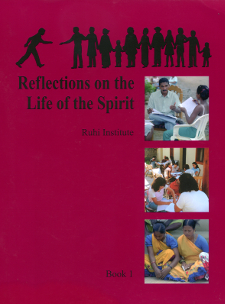
Book 1
Reflections on the Life of the Spirit
The first book in the sequence of courses is largely concerned with the question of identity. What is the real identity of the “I” in the sentence “I walk a path of service”? Three aspects of individual identity are explored in the book: “The reality of my existence is my soul which passes through this world to acquire the attributes it needs for an eternal and glorious journey towards God. My most cherished moments are those spent in communion with God, for prayer is the daily nourishment that my soul must receive if it is to accomplish its exalted purpose. One of my principal concerns in this life is to study the Holy Writings, strive to increase my understanding of the divine teachings, and learn to apply them to my own daily life and to the life of the community.” The book consists of the units “Understanding the Bahá’í Writings”, “Prayer”, and “Life and Death”. It encourages those who study it to take a first step on the path of service by hosting a meeting for prayer and worship in their home.
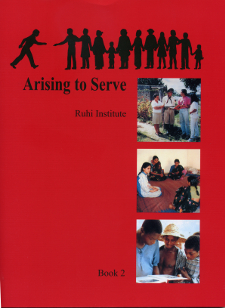
Book 2
Arising to Serve
Book 2 of the main sequence considers what it means to walk a path of service. It consists of three units. The first explores the nature of the joy one derives from serving others, while the next two focus on the knowledge, abilities and qualities needed to enter into conversations that are uplifting to the mind and spirit. The ability to elevate day-to-day conversations by introducing spiritual principles, when the occasion calls for it, is addressed in the second unit. The third, then, turns to community life. Visiting friends and neighbors in their homes to discuss themes central to spiritual and social existence—the second act of service encouraged in the main sequence—strengthens ties of unity and fellowship, so essential to collective life. The three units are entitled: “The Joy of Teaching”, “Uplifting Conversations”, and “Deepening Themes”.
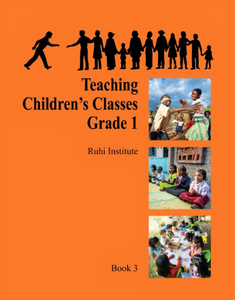
Book 3
Teaching Children’s Classes,
Grade 1
The third act of service addressed by the Ruhi Institute is in the area of the spiritual education of children. The education of children is essential to the transformation of society. Book 3 focuses on some of the knowledge, skills and qualities necessary for those wishing to enter this important field of service. It consists of two units, “Some Principles of Bahá’í Education” and “Lessons for Children’s Classes, Grade 1”. The first unit examines certain principles and concepts inherent to education from a Bahá’í point of view. It also discusses how a teacher can manage a class with a great deal of love and understanding and, at the same time, with the discipline necessary to create a proper learning environment. The second unit offers a set of twenty-four lessons intended to foster the development of spiritual qualities in small children—qualities like honesty, generosity, and trustworthiness. Some preparatory material for teachers is also included.
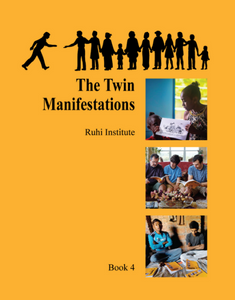
Book 4
The Twin Manifestations
Book 4 in the main sequence returns to the question of identity, the “I” in the statement “I walk a path of service”. History shapes much of the identity of individuals, as well as entire peoples. The second and third units in the book are dedicated to the study of the life history of Bahá’u’lláh, the Author of the Bahá’í Faith, and His Forerunner, the Báb. In the first unit, the significance of this Day is briefly examined. Seeing clearly the elements that characterize the past enables individuals to contribute more effectively to shaping the future.
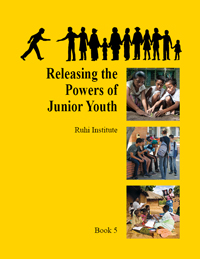
Book 5
Releasing the Powers of Junior Youth
This book has a special place in the sequence of the Ruhi Institute. According to the Bahá’í teachings, an individual reaches the age of maturity at 15, when spiritual and moral obligations become binding. The years immediately before this age, then, take on special significance. This is the time when fundamental concepts about individual and collective life are formulated in the mind of an adolescent struggling to leave behind the habits of childhood. Youth between the ages of 12 and 15 have much to say, and whoever treats them as children misses the opportunity to help them form a proper identity. The three units that make up Book 5 focus on some of the concepts, skills, qualities, and attitudes that experience has shown are required by those wishing to implement a program for the spiritual empowerment of junior youth.
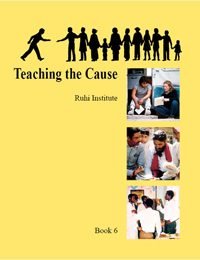
Book 6
Teaching the Cause
People from every background are welcome to explore the teachings of Bahá’u’lláh and learn how they can apply them to better their lives. All Bahá’ís, then, share liberally and unconditionally the teachings and precepts of their Faith. Although the propagation of Bahá’u’lláh’s message is one of the most essential services to be rendered, teaching is also a natural expression of a state of being—a state in which one is moved to share with others the knowledge and joy one finds in His Revelation. This concept is explored in the first unit of Book 6, “The Spiritual Nature of Teaching”. It takes as its premise the understanding that “being” and “doing” are inseparable aspects of a spiritual life. The second and third units, “Qualities and Attitudes Essential for Teaching” and “The Act of Teaching”, take this premise further. The second unit considers how one’s inner state contributes to, and is strengthened by, one’s efforts in the field of service, while the third looks at how the act of teaching should be approached. Of particular significance is the example offered in the third unit, through the story of Anna and Emilia, of how to introduce the Faith to someone who knows little about it.
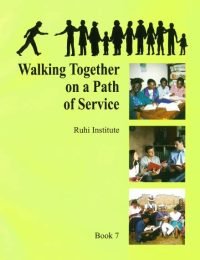
Book 7
Walking Together on a Path of Service
Book 7 is dedicated to an act of service crucial to the functioning of the Ruhi Institute itself, namely, helping a group of individuals go through the initial six courses in the sequence. That individuals accompany one another on a path of service to their communities is central to the process of capacity building set in motion by the courses. The first unit of the book, “The Spiritual Path,” raises awareness of the spiritual dynamics of advancing along a path of service and increases understanding of the forces at work. The second unit, “Becoming a Tutor of Books 1–6,” examines some of the concepts, attitudes, skills and abilities that contribute to the capability of helping a group of friends to go through the earlier courses. This is generally done by bringing together eight or ten people in what is termed a “study circle”. The third unit, “Promoting the Arts at the Grassroots,” is designed to create appreciation for the role of artistic endeavors in the activity of a study circle.
Book 8
The Covenant of Bahá’u’lláh
The units that will make up this book are currently available in pre-publication form, and a description of their content is forthcoming.